Startups developing CO2 capture at the source, a software for robotic material handling, leveraging advanced AI diagnostics, revolutionizing space mobility, turning building data into actions, treating autism spectrum disorders each win CHF 10,000
25.11.2023
Divea, Flink Robotics, Med4cast, peakFlow, PAVE Space, and Translation-X win Venture Kick's first stage of financial and entrepreneurial support. Their projects produce special filters that can capture the CO2 produced by industries and avoid releasing it into the atmosphere; build software intelligence that will power the next generation of industrial robots; revolutionize pre-surgery evaluations in the musculoskeletal domain with their advanced AI diagnostic tool; offer innovative propulsion solutions, targeting a market hungry for space mobility; and offer therapeutic benefits to individuals with autism.
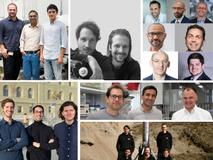 |
 Divea: CTO Mojtaba Chevalier, Technical Advisor Kumar Agrawal, and CEO Karl Khalil
|
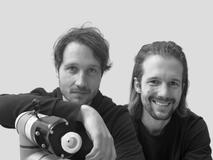 Flink Robotics: CEO Dr. Moritz Geilinger and CTO Simon Huber
|
 Med4cast: From left to right and up to down, Medical Director Founder Alexandre Ladermann, Founder Philippe Collin, Founder Patrick Denard, Founder Frank Kolo, Chairman Founder Heiner Weber, Founder Serge Rovenne, and CEO Maximilien Renard.
|
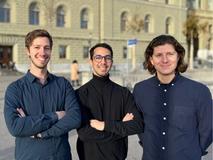 peaKFlow: Technology Lead Tiago Salzmann, Business Lead Yvan Bosshard, and Product Lead Rafael Monasterios
|
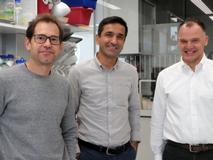 TranslationX: Peter Scheiffele, Ozgur Genc, and Guido Koch
|
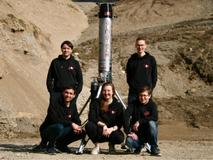 PAVE Space: CTO Jérémy Marciacq, Propulsion Engineer Pierre Morin, CEO Julie Böhning, Head of Propulsion Simon Both, and Electrical Engineer Lionel Isoz
|
Divea: Capturing CO2 at the source
Industries like cement, steel and chemicals account for about 34% of global CO2 emissions. Emissions from these industries are notoriously difficult to abate because, in addition to emissions associated with energy use, a significant portion of industrial emissions come from the process itself.
Divea produces special filters that can capture the CO2 produced by these industries and avoid releasing it into the atmosphere. Their filters are made using a 1 atom-thick selective layer of graphene, a Nobel prize winning material. Thanks to its record-breaking properties, their graphene membranes can tackle these hard to abate industries at a viable economic cost and a low energy penalty, which not possible with other existing technologies. The team, who’s spinning out from the Laboratory of Advanced Separations at EPFL, is composed of CEO Karl Khalil, CTO Dr. Mojtaba Chevalier and Scientific Advisor Prof. Kumar Agrawal.
The Venture Kick funds will accelerate the scale-up of their technology and its adoption in industrial sites.
Modern factories today are highly automated, boasting over 4 million industrial robots in the automotive, electronics, and pharmaceutical industries. Despite this, human labor remains predominant in material handling tasks outside these controlled environments. This is primarily due to the element of variation. In factories, robots are manually customized and programmed for specific tasks. However, in more dynamic sectors like logistics, retail, or healthcare, robots must adapt to constantly changing workspaces and a wide variety of objects. In this challenge, they currently lag behind human capabilities.
Flink Robotics is set to change this paradigm by building software intelligence that will power the next generation of industrial robots. The software FlinkAI empowers robots to become versatile, plug-and-play workers for material handling. Leveraging years of research in robotics, machine learning, and simulation, FlinkAI features machine perception and dexterity, enabling adaptive, multi-robot collaboration to solve material handling challenges beyond pick-and-place. The company was incorporated in 2023 as a spin-off from the Computational Robotics Lab at ETH Zurich. Founders and board members include CEO Dr. Moritz Geilinger, CTO Simon Huber, and scientific advisor Prof. Dr. Stelian Coros. Together, they are building the software foundation to unlock the potential of industrial robotic automation, and revolutionize material handling.
The Venture Kick funds will contribute to accelerating pilot projects with industrial partners.
Med4Cast: Revolutionizing pre-surgery decision-making by leveraging advanced AI diagnostics
Med4Cast tackles the challenge of imprecise pre-surgical assessments, employing cutting-edge AI to help surgeons decide whether surgery is recommended or not. Their first product aims to significantly lower a specific unnecessary musculoskeletal surgical procedure, boosting patient safety and healthcare efficiency. This enhances patient outcomes, reduces unnecessary surgeries, and creates a more efficient, cost-effective healthcare system.
Med4Cast, led by eminent surgery and imaging experts, a medical software virtuoso, and a veteran early-stage entrepreneur, is set to revolutionize pre-surgery evaluations in the musculoskeletal domain with their advanced AI diagnostic tool. Leveraging proprietary patient and imaging data through sophisticated machine-learning algorithms, they strive to offer unmatched precision in predicting surgical outcomes. Initially focusing on shoulder surgeries, particularly Rotator Cuff Repairs (RCR)—a market with an estimated 570,000 annual procedures in the U.S. alone—our goal is to capture a significant portion of the rapidly expanding diagnostic solutions sector, a multi-billion-dollar industry. Med4Cast's trajectory includes broadening its scope to encompass various pathologies, marking a new era in healthcare diagnostics
The startup will use funds to set up an online landing page, to improve their understanding of the market by identifying and visiting key opinion leaders in RCR surgery in Switzerland and the US and by getting access to proprietary market research databases. In parallel, they want to identify partners to submit for a European Project in relation to Value-Based Healthcare.
PAVE Space: Revolutionize space mobility
PAVE Space seeks to revolutionize space mobility by overcoming the key hurdle of propulsion with green, tailor-made propulsion systems, extending Earth's economic zone to orbit.
PAVE Space is co-founded by passionate EPFL graduates with diverse experience, including time at Rocket Factory Augsburg and The Exploration Company, building on the legacy of the Gruyère Space Program. The start-up offers innovative propulsion solutions, targeting a market hungry for space mobility. Their innovative solutions and expertise span the entire supply chain, reducing lead time and significantly simplifying client operations in a rapidly growing industry.
The Venture Kick Stage 1 funds will be pivotal for reaching customers through major events like Space Tech Expo Europe and crafting impactful marketing materials, alongside enhancing their market analysis capabilities with advanced databases.
peaKFlow: Turning Building Data into Actions
30% of global energy production is used in buildings, yet facility managers struggle to operate their infrastructure efficiently. peaKFlow provides a solution to make better use of their limited resources, reducing costs and energy consumption, and potentially saving up to 3mln tons of CO2 annually in Switzerland alone.
First, peaKFlow's sensing network acquires fine-grained air quality, utilization, and anonymous occupancy data. Not requiring cables or batteries, the devices can be easily and cheaply deployed in high numbers. Data is then processed by peaKFlow's cloud service, automatically generating insights, providing suggestions to improve operations, and automatically implementing measures to reduce consumption. Given the low cost, peaKFlow is also suited for smaller assets, tapping into a 44 billion USD market for smart building technologies. The founding team consists of Tiago Salzmann (Technology Lead), Yvan Bosshard (Business Lead), and Rafaél Monasterios (Product Lead).
With the support of Venture Kick, peaKFlow will acquire a deeper understanding of its target customers, verify pain points, and onboard early adopters willing to help shape the technology. Furthermore, the public presence of peaKFlow shall be refined, in line with these insights, by defining a marketing strategy.
Translation-X: Targeting selective mRNA translation for a precision medicine approach in autism spectrum disorders
Autism spectrum disorders represent an unmet medical need, marked by difficulties in social communication. Currently, there are no approved therapeutics available to alleviate the core symptoms of these conditions. Understanding the underlying pathology and identifying drug targets are crucial challenges in the field of autism. Translation-X focuses on exploring selective mRNA translation as a therapeutic avenue for autism spectrum disorders. The group has identified dysregulated mRNA translational homeostasis as a converging pathology in autism. Specifically, they have pinpointed Map-kinase interacting kinases (MNK) as a drug target. Their research demonstrates that inhibition of MNK restores defects in translational homeostasis and neural function, thereby offering therapeutic benefits to individuals with autism.
Established in early 2022 as a spin-off project at the Biozentrum, University of Basel, Translation-X is capitalizing on validated preclinical target discoveries. The team is actively involved in creating brain-penetrating and selective small-molecule MAPK-interacting kinase inhibitors to address autism therapeutically. These inhibitors show considerable potential in mitigating the core symptoms of autism spectrum disorders, providing a precisely targeted approach to confront this complex condition. The core team at Translation-X includes Dr. Özgür Genç, serving as the senior scientist and project leader, with Prof. Peter Scheiffele as the scientific advisor, and Dr. Guido Koch as the medicinal chemistry advisor. Additionally, faculty members Prof. Martin Smiesko, Prof. Markus Lill, and scientists Manuel Sellner and Jacek K?dzierski from the Pharmazentrum contribute computational chemistry expertise to the project.
The funds received from VentureKick will be used to expedite the drug development project, propelling it from the hit to the lead stage.


